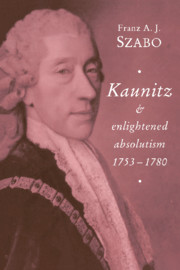9 - Conclusion
Published online by Cambridge University Press: 28 August 2009
Summary
Ever since the term “enlightened absolutism” was coined by Wilhelm Roscher over a century ago, historians have disagreed bitterly on the validity of this concept as a meaningful description of that critical transition phase when the traditional corporate society of medieval and early modern Europe was being displaced by the emerging modern unitary state. Disagreements have ranged from the internal contradiction implicit in the very label of “enlightened absolutism” or even more, “enlightened despotism,” through questioning the motives of the monarchs and governments purportedly engaged in such an enterprise, to wondering what kind of truth the very idea had for those eighteenth-century thinkers who accorded it any truth at all. These disagreements notwithstanding, there is broad agreement that a larger dynamic of reform and change characterized many states of Europe in the second half of the eighteenth century, particularly in those which perceived their relative underdevelopment as the principal impediment to international competitiveness. Indeed, some historians have even argued that the perception of backwardness was the very precondition of the emergence of reforming regimes we have come to call enlightened absolutist.
Inevitably, such debates tend to focus on individual monarchs, for even when detailed research invariably reveals that most of them were hardly as absolute as one might think from the use of the term, they were certainly the fulcrum of the policy decision-making process.
- Type
- Chapter
- Information
- Kaunitz and Enlightened Absolutism 1753–1780 , pp. 346 - 354Publisher: Cambridge University PressPrint publication year: 1994

